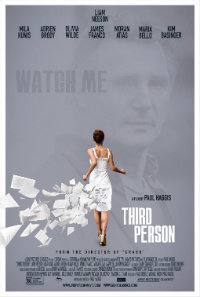World Crash: Haggis Overextends His Usual Formula
 Two’s company, three’s a crowd. Or so the saying goes. Further beating the interrelated/intersecting characters and multiple storyline motif into the ground, as he already did to such ungainly effect with his 2005 best picture winner Crash, Paul Haggis outdoes himself with his latest, Third Person. While it’s clearly an ambitious project, this mammoth of interrelatedness is uncomfortable, unwieldy, and so insistently labyrinthine that it quite literally chokes the life out of itself.
Two’s company, three’s a crowd. Or so the saying goes. Further beating the interrelated/intersecting characters and multiple storyline motif into the ground, as he already did to such ungainly effect with his 2005 best picture winner Crash, Paul Haggis outdoes himself with his latest, Third Person. While it’s clearly an ambitious project, this mammoth of interrelatedness is uncomfortable, unwieldy, and so insistently labyrinthine that it quite literally chokes the life out of itself.
Veering frenetically from one scenario to another, it feels akin to switching random channels back and forth, even as it obviously coalesces into what certainly feels like an equal mix of smug ambiguity and indisputable absolutes. Crackling along like some fractured opera of infanticide inspired vignettes, the conundrum with the film is this—it will surely stick with you long after its end credits because of a deliberately manipulative structure, but that doesn’t make it a compelling slice of cinema.
Michael (Liam Neeson) is a Pulitzer Prize-winning author who hasn’t been able to repeat the same success he had with his first novel. Holed up in Paris to complete his latest manuscript, Michael has recently left his wife Elaine (Kim Basinger) to pursue an affair with Anna (Olivia Wilde), a journalist who yearns to write her own prose. Upon arriving in Paris to join Michael, they seem to share a consuming sexual attraction for one another, yet a strange tension continues to flare up between them, seemingly caused by the texts Anna keeps receiving from another lover who has also just arrived in the City of Lights. Meanwhile, Scott (Adrien Brody) is a shady American that steals designs from fashion houses to make cheap knockoffs. Traveling to Italy for some work related scheme, the surly xenophobe meets Monika (Moran Atias) in a café. Struck by her beauty, he learns she is trying to be reunited with her estranged daughter, who is being smuggled into the country from Romania. Unwittingly, because he’s far away from his own daughter, he becomes her reluctant benefactor. Lastly, an ex-soap opera actress, Julia (Mila Kunis), is fighting for custody of her 6 year old son from ex-husband Rick (James Franco), a famous New York artist. Alarming circumstances, including the perceived harm of the child, surround the divorce, and Julia has been forced to take a job in an upscale hotel that she used to frequent. Julia’s lawyer, Theresa (Maria Bello), has secured her a second chance at getting to see her kid, while Rick’s new girlfriend, Sam (Loan Chabanol) feels stuck in the middle. Throughout all their scenarios, a faint voice is heard whispering, “Watch me.”
If you belong to the school of thought that believed Crash was at the overwrought zenith of the multi-storied, interconnected onslaught that seemed so increasingly prevalent in the last decade, then you’ll be sure to find Third Person a gargantuan successor that makes Haggis’ previous effort look demure in comparison. Scenes cut away intermittently and abruptly across its three central narratives, with generous crosscutting between, only enhancing the contrived convenience of the script.
There are several eye rolling doozies in store for you, one dropped with a thud that reminds one of a similar reveal from Charlize Theron’s character in 2012’s Prometheus. Likewise, a scene between a teary Mila Kunis and Loan Chabanol plays almost exactly like the one between Sandra Bullock and her maid in Crash. And thus, at its core, Third Person is all style over substance, revealing its characters to be certain types but not quite thoroughly fleshed out at all. Then, distracting hints such as how can Kunis’ maid in NYC can possibly be cleaning the same room as the one Wilde and Neeson occupy in Paris amplifies the forced nature of the concept at work.
Some of the performances, however, are surely watchable. Liam Neeson, sans his henpecking at the keyboard, conveys a wearied author well enough, and shared scenes with an underutilized Basinger over the phone and the supremely complicated Olivia Wilde as his mistress are intriguing up until it drops its bombshell. James Franco and Mila Kunis’ segment seems entirely undeveloped, while Adrien Brody’s gallivant through Italy with Moran Atias feels dreadfully misconceived, a segment that stretches on and on and on. Once we discover how exactly all of these people fit into the continuum, one must be reminded of a scene between Neeson and his publisher, who balks at a rough draft submitted by the seasoned author, castigating him for the miasma of unrelated characters skulking around without much ado. “I was embarrassed to read it,” the man finally admits.
Perhaps this is Haggis’ way at laughing at himself first. But it sure feels like a deadly premonition about the film as a whole. Bloated to an excessive 137 minute running time, Third Person is an oversaturated mess of idea, thought, and theme. “Watch me,” the refrain that haunts the central conceit ends up sounding like an ironic request of desperation.
★/☆☆☆☆☆


